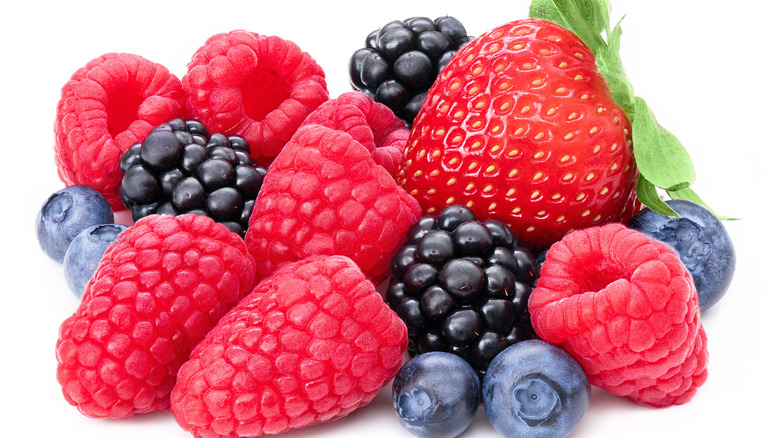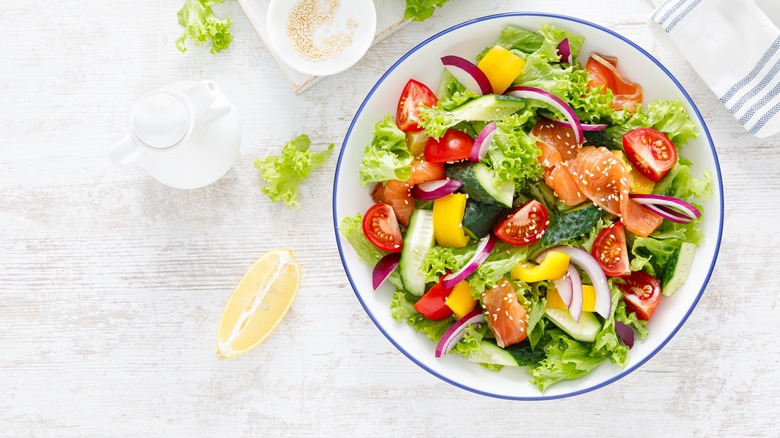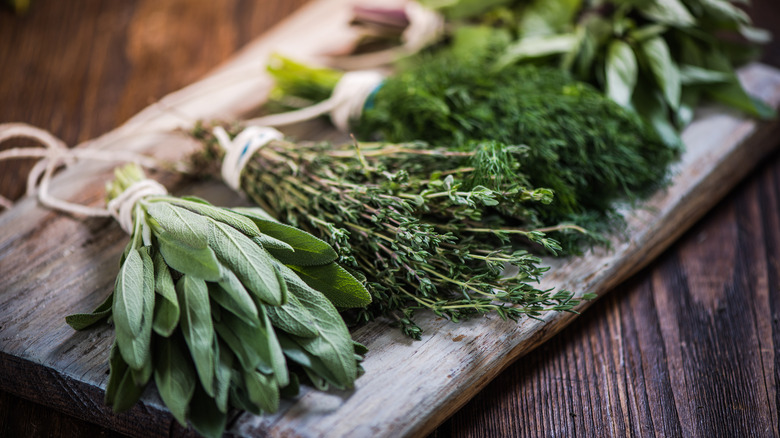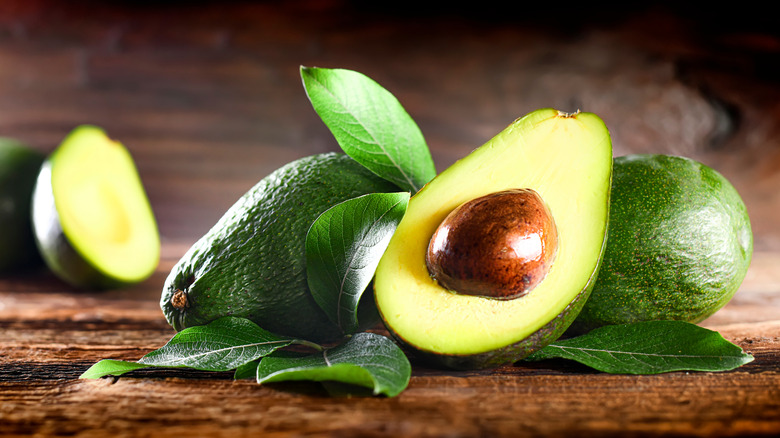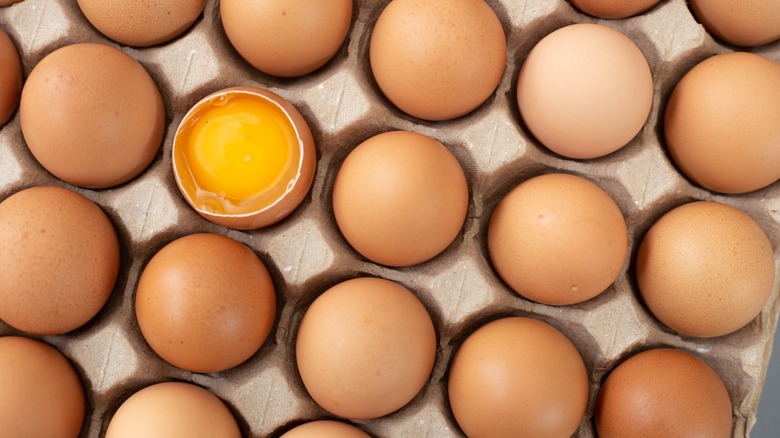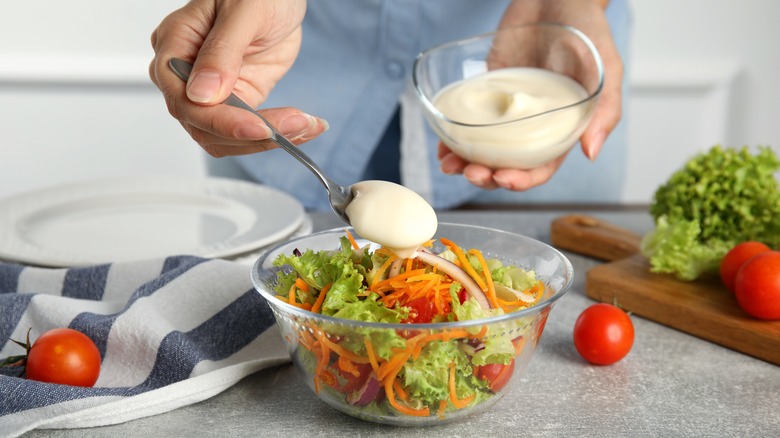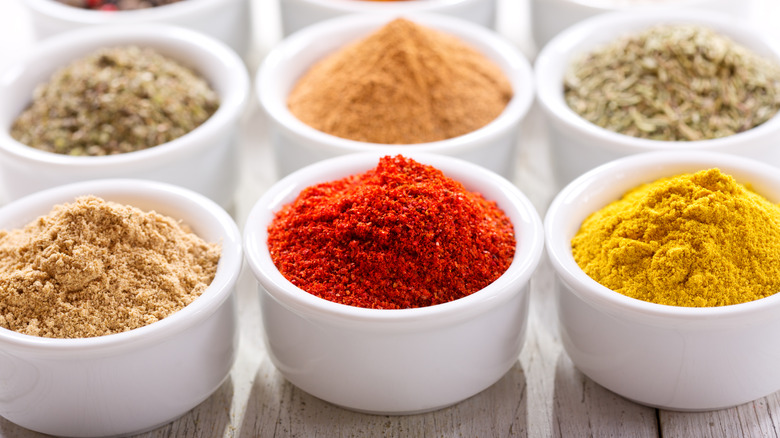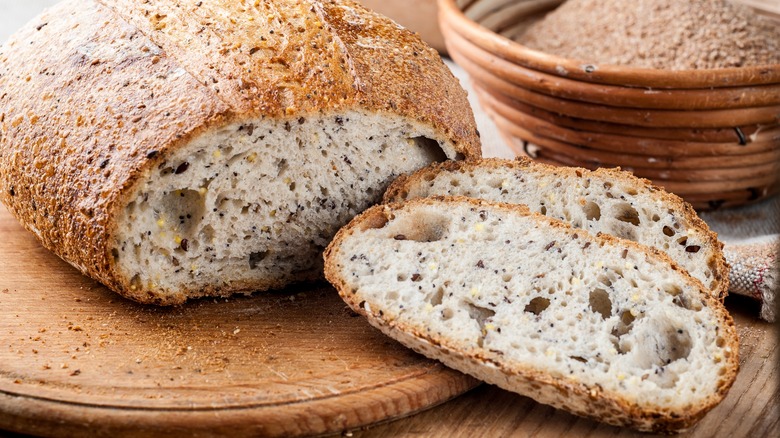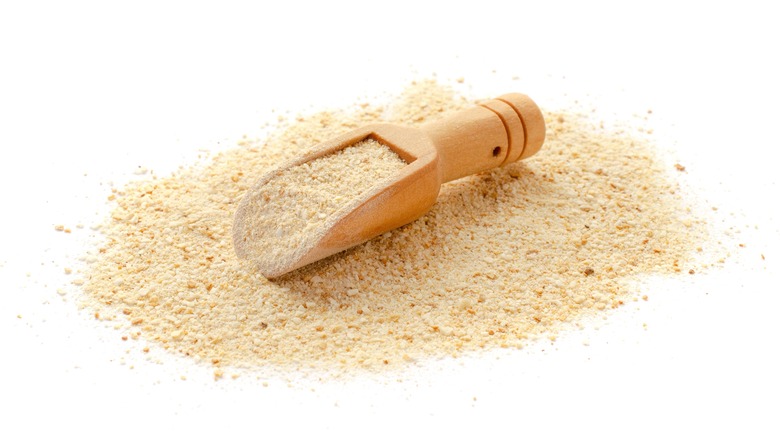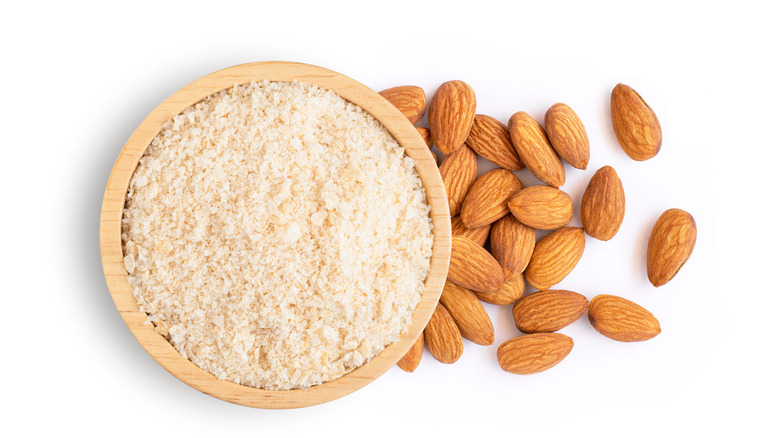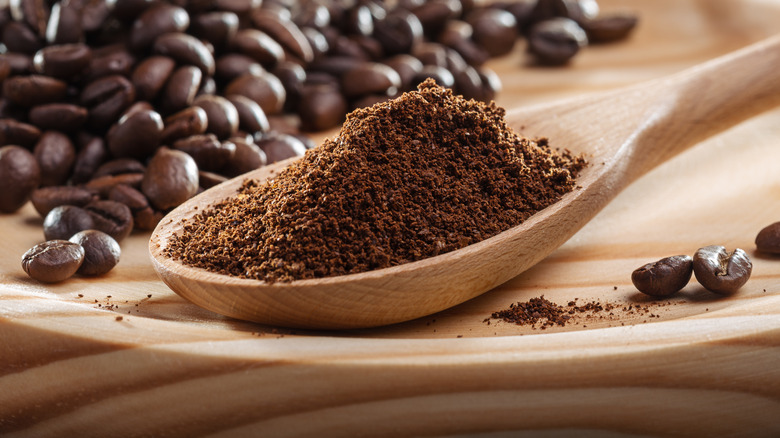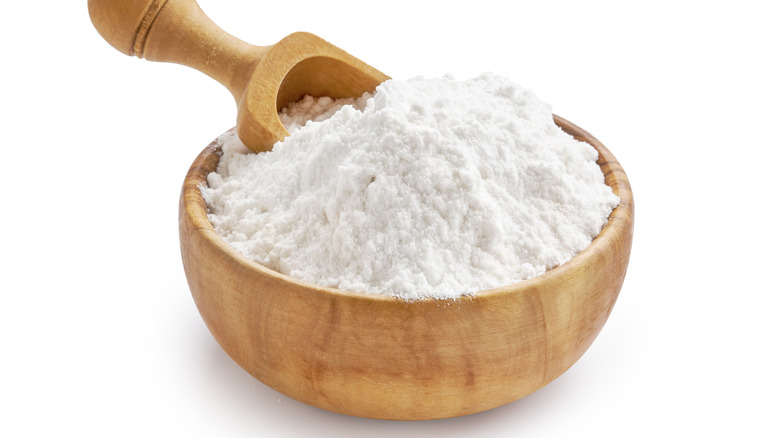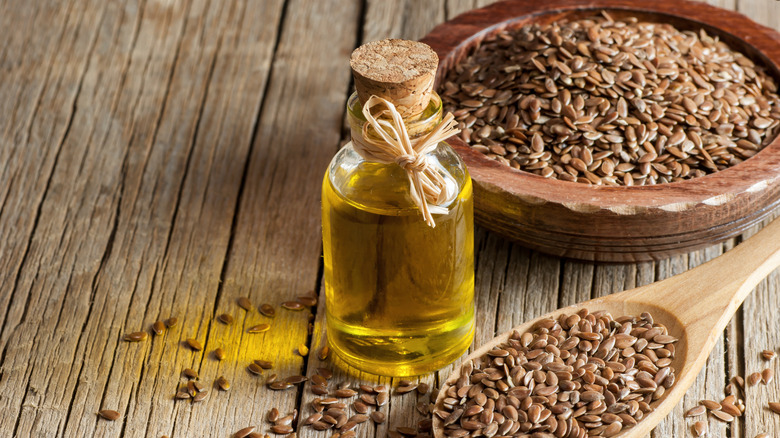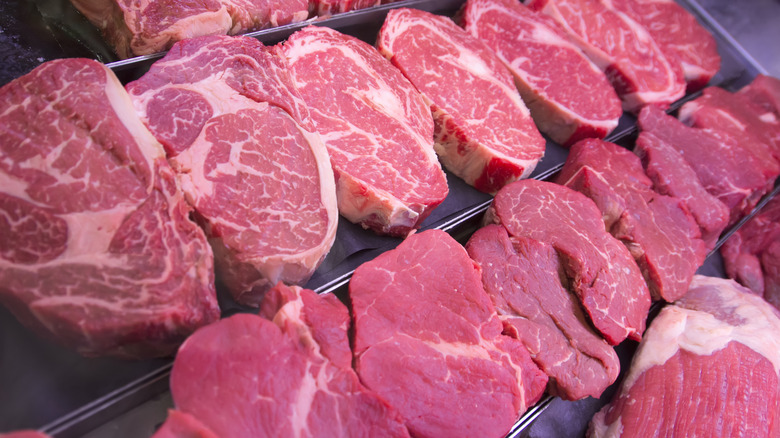14 Foods You Think Twice About Buying In Bulk
There are benefits to buying some foods in bulk; however, some items are better chosen in small amounts as you need them. It's important not to confuse buying bulk foods and buying foods in bulk. According to Tree Hugger, when you shop at a store that offers bulk foods, you get to choose how much you bring home. For example, there may be an area in the store where you grab a plastic bag, fill it with as many oats, nuts, or dried fruit as you like, and purchase according to weight. Buying in bulk, however, refers to shopping at wholesale stores that sell prepackaged food and other items in large amounts.
Buying in bulk is convenient as it can lessen the number of trips to the store and that's helpful for busy families. Still, purchasing food this way can also be a waste of money if you don't use up what you buy before it expires. In this article we'll look at the foods you shouldn't buy in bulk, so the next time you go to your favorite wholesale store, you can search for the items that are helpful in bulk and avoid the ones that aren't.
Berries
Seeing beautiful, healthy berries in bulk could tempt any shopper to stock up. It seems like the right thing to do when you can purchase healthy food at bulk prices. Unfortunately, berries are a very fragile food and spoil quickly. There are a lot of hacks to help keep fresh fruit longer, but even with those, it's tough to help berries in bulk last long enough to finish them.
The problem with berries, such as blackberries, strawberries, and blueberries is that they hold onto moisture. That's a good thing because without moisture you have dry fruit that isn't sweet and juicy. However, the moisture that berries easily carry helps them to mold quickly (via Food Hero). If you have ever felt the frustration of buying a pound of strawberries and seeing them covered in mold the next day, it's moisture that was likely the culprit. Berries are porous and they also naturally contain mold spores, so any moisture that gets in helps that mold to flourish. Stick with small amounts of berries at a time for the best tasting and safest results.
Leafy greens
No one wants a salad with wilted, brown lettuce. Although there are some tricks to keep it fresh longer, you shouldn't buy them in bulk unless you eat a lot of leafy greens.
WebMD explains that leafy greens such as lettuce should be kept refrigerated and even then, they only last for about a week. If you buy lettuce that has already been packaged, the lifespan is even shorter once you get it home. It's likely to turn brown and wilt within just a few days. It's recommended that you throw away your bagged lettuce just two days after opening it.
When you buy any amount of leafy greens, check them out closely to make sure they haven't already started to lose their freshness before you purchase them. Brown spots and droopy leaves aren't a good sign. If you're craving a salad, you're better off running out for your leafy greens the day you're going to use them, rather than buying in bulk.
Fresh herbs
There aren't many aromas more lovely than fresh-cut herbs. Basil, Thyme, or rosemary can fill the house with their beautiful scent. When shopping for herbs, be careful not to confuse dry herbs with fresh herbs. Dried herbs are of course, dried and then sold as is or ground and bottled, which is what you often see in the spice aisle at the store. Fine Dining Lovers writes that dried herbs are less expensive than fresh herbs. They also last much longer, sometimes up to a year. However, they will lose their potency after a few months.
Fresh herbs are cut fresh, packaged, and not tampered with. Their aroma and flavors are more potent than dried herbs, simply because they are fresh. Still, fresh herbs have a downside — they don't last long. You must plan on using them quickly before they wilt. It's not a good idea to buy these types of herbs in bulk. Instead, plan ahead and buy fresh herbs as you need them.
Avocados
According to the Agricultural Marketing Resource Center, Americans ate about 8 pounds of avocados per person in 2021. Seems we like our avocados and that's a good thing. Avocados might improve digestion, lower the risk of depression, and contain several nutrients, including fatty acids, folate, beta-carotene, and more per Medical News Today. With so many wonderful attributes it makes sense to keep plenty of avocados on hand, However, don't go overboard. Avocados may ripen slowly, but after that, they go downhill quickly.
When shopping for any number of avocados, one way to tell if it's ripe is to check out the stem. The stem is where the avocado was attached to the tree and if the avocado is ripe, you can easily peel back just enough of it to take a peek and expose that lovely avocado green color. If it won't budge, the avocado isn't ready to eat. It's perfectly fine to purchase unripened avocados if you aren't planning on eating them in the next few days. However, if you want to make guacamole that night, you'll need soft, ripe avocados. Either way, buying them in bulk isn't a great idea since after they ripen, they don't last long.
Eggs
Eggs are a fabulous food, full of protein and usually sold at an affordable price. Bulk eggs are often even cheaper, but that's not necessarily a good thing. Cheap may save you some money but it isn't always the best choice.
It's not about the actual egg, but the life of the hen who lays the egg. According to Nest Fresh, eggs labeled "cage free" are often more expensive because the hens are allowed to roam freely, unlike traditional chicken farms where the hens are literally caged for most of their lives. Because the hens live a happy life, roaming about, they expend more energy and cost more to feed. That extra feed is reflected in the cost of cage free eggs. Sure, you could still buy the cheaper eggs, but when you support the small farms that are making an effort to treat the animals humanely, you are sending the message that you appreciate the efforts, and you'd like to see more companies make the switch to cage free. You're also helping hens live a happy life when you avoid the cheap, wholesale eggs in bulk.
Mayonnaise
According to the United States Department of Agriculture, mayonnaise can be in the refrigerator for up to two months after opening. That's not too bad unless you have one of those giant bulk jars of the stuff. Once it's opened, that is a lot of mayo to use up within two months. Still, let's cut mayonnaise a little slack. It does get a bad rap as it's often blamed as the sneaky guy that causes food poisoning at summer BBQs. The reality is that mayonnaise is quite acidic because of the vinegar in it, and it's usually the meat in dishes, such as chicken salad, that goes bad as it sits out in the sun or on the kitchen counter, unrefrigerated (via The New York Times).
Mayonnaise may not be the common culprit for food poisoning; however, it is still a food you should never buy in bulk. Mayo is full of sugar and preservatives, so it isn't healthy and you're better off not eating it in bulk quantities.
Dried spices
It's easier to keep dried spices on hand rather than fresh ones. Still, the flavors you enjoy do start to fade as the spices age. Unfortunately, it's tough to use a jar of spices quickly. And if you think about it, the dried spices you buy in bulk aren't ground and jarred the day you get them. Who knows how long they have been sitting there losing their potency? According to Insider, since many spices take years to make it from farm to supermarket, they have already lost a lot of potency before you even get them home.
There are some spices that should always be handy in your kitchen, such as oregano, cinnamon, or garlic and even those shouldn't be bought in bulk. You want your everyday spices to have just as much flavor as the day you bought them. It's recommended that you change out your spices every eight months and that can get expensive. Buy the smallest quantities you can get by with so replacing isn't such an investment.
Bread
Nothing smells yummier than a fresh loaf of bread. It's one of the most tempting things in the bakery section as you walk by it at the grocery store. Sadly, not many things mold faster than it either. The moisture and nutrients found in bread allow mold to feed and grow rapidly.
Storing your bread in a cold place like the refrigerator will slow down mold growth, according to Biology Wise. However, Culinary Lore points out that cold bread changes its texture and can seem stale after being refrigerated. The solution? By fresh bread only in the quantity that you can use up. Bread has one of the shortest shelf lives at just three to seven days when stored at room temperature on your counter, per Healthline. You can freeze bread, but again, just as when it is refrigerated, the bread will seem dried out and stale once it defrosts. It truly isn't a bulk food buy.
Breadcrumbs
Breadcrumbs are crazy handy when you need them. Without them, you'd have to dry out bread and grind it up to make crumbs. They are often used for coating foods before frying, such as fried chicken or other breaded treats. Maybe you use them in the Italian meatball recipe that's been handed down for generations in your family. However, realistically, breadcrumbs aren't something you are likely using on a daily basis. They're just a container full of dried crumbs, but breadcrumbs are something you should never buy in bulk.
The reality is that even though breadcrumbs look like something that would last forever in their dried state, they were once a loaf of bread, and they will go stale. Stale breadcrumbs will leave an unpleasant flavor with the food you add them to. And here's the other reality about buying breadcrumbs in bulk: the containers are massive. Who has that kind of room in the pantry? Save the shelves for items that last a long time. Buy your breadcrumbs in one small container at a time.
Almond or coconut flour
Gone are the days of quickly grabbing a bag of white flour at the store. Today, there are many varieties of flour, including almond and coconut flour. They are both gluten-free options and can be used in many baked goods. Still, unless you bake constantly, flours such as almond or coconut have a shorter shelf life than all-purpose flour.
According to Women's Health Magazine, all-purpose, white flour can last about a year in your pantry and even longer in the refrigerator or freezer. However, almond and coconut flour don't last nearly that long, with a shelf life of around three months in the pantry. These types of flours are a wonderful, healthy option, especially if you're negatively affected by wheat flours. However, their higher fat content helps them to spoil quickly. If you aren't sure if your coconut or almond flours are bad, pay attention to the colors. They will start to darken as they begin to spoil, and may even taste bitter or sour, per Does It Go Bad. Stick with buying the quantity you can use within a few months.
Coffee
If you were taught to keep coffee fresher longer in the refrigerator, it's time to rethink that idea. You're just creating cold coffee that can absorb odors from your refrigerator. Serious Coffee explains that it would take much colder temperatures than your refrigerator to add any freshness to your coffee beans or grounds. It's basically a waste of refrigerator space. Plus, just like baking soda in the refrigerator, coffee is great at absorbing odors, which means it is going to pick up odors in your refrigerator and transfer that to the flavor of your coffee. Yuck.
It's recommended that you always begin with fresh beans and grind them as you use them; however, fresh beans only last about a week when stored at room temperature, and only two weeks in the freezer. If you love fresh coffee, buying in bulk probably isn't wise. If you go the "already ground" route, your ground coffee is only fresh for about three to four months after opening (via Presto Coffee). All in all, your best bet is to simply not buy coffee in bulk.
Baking powder
Baking powder can last for six months to a year, which isn't too bad. Still, its powers weaken before that, and most recipes don't use large amounts at a time. David Lebovitz explains that moisture and humidity negatively affect baking powder and cause it to become less effective. To make yours last as long as possible, store it in a cool dry place (not the refrigerator). If it's been around for over six months, you can test some of the baking powder before using it to see if it's still active.
To do this, simply place ½ teaspoon of the powder in a bowl and then pour ¼ cup of boiling water over it. If the baking powder is still good, it will bubble up right away. If not, it will have little to no reaction. In that case, your baking powder is not going to help your baked goods. Because you want baking powder to do its job well, buying it in bulk isn't a great idea. The fresher the better.
Flaxseed oil
Flaxseed oil has many health benefits and people enjoy using it in salad dressings, smoothies, and adding it to baked goods. According to Very Well Health, flaxseed oil reduces inflammation, lowers the risk of cancer, and may help in preventing heart disease. It's a wonderful, natural oil, and you may enjoy having it on hand. However, don't go overboard and buy too much at once. Since it is all-natural, flaxseed oil spoils quickly.
When it comes to economy sizes, you should think twice about buying any cooking oil in bulk. It seems like something that could last forever, but oils actually become rancid within six months to a year, and often well before the expiration date (via Nutrition Facts). Flaxseed oil, although not considered a cooking oil, is one of the worst offenders. Kitchen Stewardship writes that you must never buy flaxseed oil that isn't in the refrigerated section of the store. Once the oil is pressed it goes bad within six weeks, but if refrigerated, your flaxseed oil will last up to six months. More than likely, stores that sell vitamins and oils in bulk will not have them refrigerated. Choose flaxseed oil from a health food store that understands the importance of keeping it cold and in small amounts.
Meat, if you don't have the proper freezer
Meat spoils rapidly in the refrigerator, and although you can freeze it, if you don't have adequate space for a bulk meat purchase, a lot of meat might go to waste. TruBeef Organic explains that it's safe to store meat in the refrigerator for three to five days, depending on the cut of meat. After that, you are risking the growth of bacteria. One way to keep more meat on hand longer is to freeze it. However, you need the right kind of freezer, such as an upright or a chest freezer, and enough space.
Meats can be frozen anywhere from two months to a year, again depending on the type of meat. For example, a whole turkey will do better than ground beef when in the freezer for a year. Also, make sure meat is packaged properly for better freezing results. A vacuum-sealed package is best. If you have an extra freezer dedicated to storing the meat you buy in bulk, you might get away with large amounts of it. However, if you can't eat it all within a year — or within a few months for some cuts — you'll end up wasting the meat you buy in bulk.

